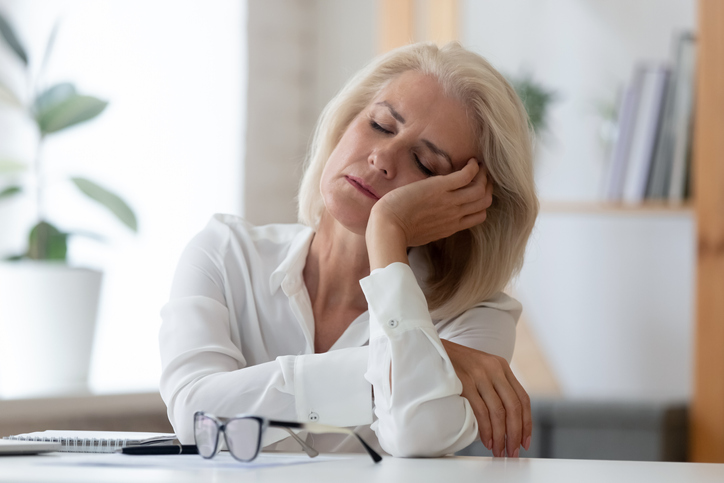Why Am I So Tired?
Do you slump in the middle of the day or are never really energised from getting up to going to bed? There are quite a few reasons why, so here’s some help to get going again.

I do seem to be speaking with more people now about tiredness than ever before. Life has certainly got stressful and more complex, and all of those things will play in to your general energy levels.
Is it a lifestyle issue?
How well do you actually look after yourself? There are three key elements that are vital to staying healthy and energised and they are your sleep, your diet, and whether you exercise.
If you think of them as three linked points in a triangle, because if you aren’t getting good sleep, it’s hard to eat well, and it’s hard to exercise. Naturally, the same is true the other way around because they are all related.
What you need to aim for is between seven and nine hours of sleep tonight, and how much you need will depend on your individual circumstances.
You need to go for a nutritionally balanced, diet of fruit, vegetables, and protein.
At Menopause, the one I find most missing from the triangle is exercise, but it really is essential that you have some form of regular physical activity.
Potential medical problems
If you feel you have those three triangle points under control, but you are still feeling tired, then it might be time to check possible medical causes of fatigue. Doctors don’t always know exactly what makes people so tired but these are some of the most common reasons.
Anaemia is a disorder that makes it hard for your blood to move oxygen around your body. Women in particular are more prone to iron-deficiency anaemia.
Iron acts like a train that transports oxygen in your blood and the signs can be not just tiredness, but you get dizzy when you stand up, have brain fog and/or get heart palpitations. It can be checked with a simple blood test.
Diabetes most common symptom is fatigue and one reason is that your body uses lots of energy to deal with your frequent changes in blood sugar levels.
It has other signs, too as you may feel thirsty and need to go to the bathroom often.
Thyroid issues are also common at menopause and this small, butterfly-shaped gland that sits in your neck makes a hormone that helps control how you use energy.
If you have an under active thyroid you are going to feel tired because your cells aren’t working well, they’re sluggish, and their responses are slow. Again a simple blood test can establish if you have problems with your thyroid.
Heart disease can result in extreme tiredness and is a common symptom of congestive heart failure, which happens when your heart doesn’t pump as well as it should.
If you have it, your fatigue usually gets worse when you exercise and you might also have swelling in your arms or legs and shortness of breath.
If you have any of these signs, then you need to speak to your doctor.
Sleep apnoea is a disorder that keeps you from getting enough oxygen when you sleep, which means you won’t get real rest during the night.
What happens is the brain notices you’re not getting rid of carbon dioxide, and it wakes you up really briefly in an alarmed state. You probably don’t know why, and that makes it hard to work out why you’re so sleepy during the day.
You don’t get into REM — the sleep that makes you feel best and you will definitely need some help from your doctor with this as there are several ways to monitor whether you have sleep apnoea and how best to address it.
Menopause definitely will impact sleep for many of us, due to changing hormones which can result in needing to get up and go to the bathroom more often in the night. Plus the impact that night sweats and hot flushes have as well.
That powerful combination of factors can keep you up at night and leave you feeling tired during the day so deal with your symptoms by rebalancing your hormones. Depending on your symptoms, you may need just progesterone, or a combination of progesterone and oestrogen.
Depression robs your brain of the chemicals it needs to work at its best. One of those is serotonin, which helps regulate your internal body clock.
It can lower your energy levels and make you feel tired during the day but you may also find it hard to fall asleep at night, or you might wake up earlier than you want in the morning.
There are a number of solutions available from alternative therapies such as acupuncture, homoeopathy, herbalism and counselling as well as medical help.
It is important to find what works best for you, and this may be a combination of things, but one of the most effective certainly is simply talking to someone about it and there are a number of excellent resources on this website: https://www.time-to-change.org.uk/mental-health-and-stigma/help-and-support
Helpful information:
Many of us experience low energy levels from time to time, and if yours are persistent, it would be definitely worth looking at your hormone balance as that can be another factor in the mix.
If you feel you would like some more help, then this article could give you some more ideas relating to diet and nutrition.
https://anna.blog.wellsprings-health.com/seven-energy-secrets-you-need-to-know/


















